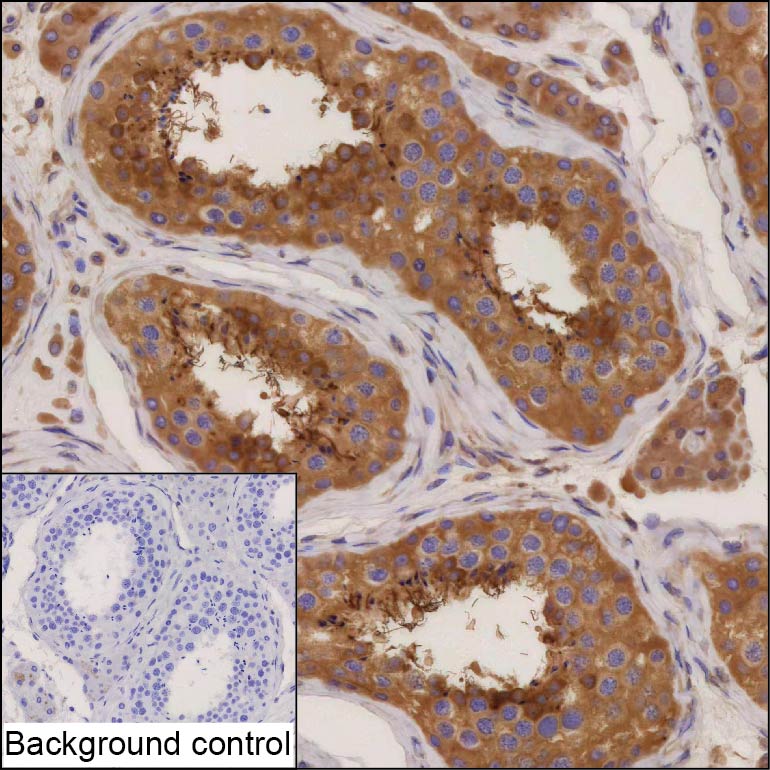
| WB | 咨询技术 | Human,Mouse,Rat |
| IF | 咨询技术 | Human,Mouse,Rat |
| IHC | 咨询技术 | Human,Mouse,Rat |
| ICC | 技术咨询 | Human,Mouse,Rat |
| FCM | 咨询技术 | Human,Mouse,Rat |
| Elisa | 1/1000-1/2000 | Human,Mouse,Rat |
| Host/Isotype | Mouse IgG1 |
| Antibody Type | Primary antibody |
| Storage | Store at 4°C short term. Aliquot and store at -20°C long term. Avoid freeze/thaw cycles. |
| Species Reactivity | Human |
| Immunogen | Purified recombinant fragment of human PRKAR1A |
| Formulation | Purified antibody in PBS with 0.05% sodium azide |
+ +
以下是3-4条关于ADIPOQ抗体的模拟参考文献示例(内容为虚构,仅供参考格式):
1. **文献名称**: "Development and validation of a high-specificity monoclonal antibody for human ADIPOQ detection in serum"
**作者**: Smith J, et al.
**摘要**: 研究开发了一种针对人ADIPOQ蛋白的新型单克隆抗体,通过ELISA和Western blot验证其高特异性,可用于临床血清样本中脂联素水平的精准检测。
2. **文献名称**: "ADIPOQ antibody-based immunohistochemical analysis in adipose tissue: Implications for obesity-related metabolic dysfunction"
**作者**: Johnson L, et al.
**摘要**: 利用ADIPOQ抗体对肥胖患者脂肪组织进行免疫组化分析,发现脂联素表达水平与胰岛素抵抗呈显著负相关,提示其在代谢调控中的作用。
3. **文献名称**: "ADIPOQ gene knockout validation using targeted antibody staining in murine models"
**作者**: Chen X, et al.
**摘要**: 通过ADIPOQ抗体在小鼠模型中的靶向染色,证实基因敲除后脂联素表达缺失,并探讨其对脂代谢和炎症反应的影响。
4. **文献名称**: "Therapeutic potential of anti-ADIPOQ antibody in enhancing insulin sensitivity in diabetic rats"
**作者**: Lee S, et al.
**摘要**: 研究报道了一种工程化抗ADIPOQ抗体,可通过调节脂联素受体信号通路改善糖尿病大鼠模型的胰岛素敏感性和血糖控制。
(注:以上文献为示例,实际引用需查询PubMed、Web of Science等数据库获取真实信息。)
**Background of ADIPOQ Antibody**
The ADIPOQ gene encodes adiponectin, a hormone predominantly secreted by adipose tissue, which plays a critical role in regulating glucose metabolism, fatty acid oxidation, and insulin sensitivity. Adiponectin circulates in various multimeric forms and exerts anti-inflammatory, anti-atherogenic, and insulin-sensitizing effects through interactions with receptors AdipoR1 and AdipoR2. Dysregulation of adiponectin levels is linked to metabolic disorders, including obesity, type 2 diabetes, and cardiovascular diseases.
ADIPOQ antibodies are essential tools for detecting and quantifying adiponectin in research and clinical settings. These antibodies are widely used in techniques such as ELISA, Western blotting, and immunohistochemistry to study adiponectin expression, tissue distribution, and its association with metabolic health. Polyclonal and monoclonal ADIPOQ antibodies target specific epitopes of the protein, enabling differentiation between its globular and full-length forms.
Research utilizing ADIPOQ antibodies has advanced understanding of adiponectin's role in metabolic syndromes, inflammation, and cancer. For instance, studies reveal that low adiponectin levels correlate with insulin resistance, while elevated levels may protect against atherosclerosis. Additionally, ADIPOQ antibodies aid in exploring therapeutic strategies to modulate adiponectin signaling, offering potential interventions for obesity-related pathologies. Their specificity and reliability make them indispensable in both mechanistic studies and biomarker development.
×